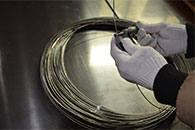Jul . 20, 2024 01:55 Back to list
Exploring the Versatility and Applications of Popular SS Mesh Screens in Various Industries
The Versatility and Importance of Famous SS Mesh Screens
When it comes to industrial applications, the significance of high-quality mesh screens cannot be overstated. One type that has gained considerable attention is the stainless steel (SS) mesh screen. Renowned for its durability, corrosion resistance, and versatility, the stainless steel mesh screen has found numerous applications across various sectors, from food processing to pharmaceuticals and even architecture.
What is Stainless Steel Mesh Screen?
Stainless steel mesh screen is a type of woven mesh made from stainless steel wire. This material is known for its excellent resistance to oxidation and corrosion, making it ideal for environments where exposure to moisture or harsh chemicals is a concern. The mesh design allows it to serve multiple functions, such as filtering, sieving, and reinforcing, making it invaluable in many applications.
Applications of SS Mesh Screens
1. Industrial Filtration One of the most prominent uses of stainless steel mesh screens is in filtration processes. Industries such as oil and gas, pharmaceuticals, and food processing utilize these screens to remove impurities from liquids or powders. Their fine mesh design ensures that only the desired particles pass through, effectively maintaining the quality of the product.
2. Construction and Architecture In construction, SS mesh screens are often used as reinforcing materials in concrete structures. They add strength and stability, preventing cracks and enhancing overall durability. Additionally, architects use stainless steel mesh for aesthetic purposes, creating visually appealing façades, railings, and dividers that maintain structural integrity while offering a modern look.
3. Automotive and Aerospace The automotive and aerospace industries benefit greatly from SS mesh screens for their lightweight yet robust properties. In automotive applications, they can be used in air and fluid filtration systems, ensuring engines operate efficiently and reliably. In aerospace, they serve similar functions while meeting stringent standards for safety and performance.
famous ss mesh screen

4. Food and Beverage Processing In the food industry, hygiene and safety are paramount. Stainless steel mesh screens are essential for separating solids from liquids, ensuring that food products are clean and safe for consumption. Their resistance to rust and corrosion also means they can withstand regular cleaning, essential in maintaining sanitary conditions.
5. Environmental Protection Stainless steel mesh screens are also employed in environmental applications, such as water treatment and waste management. They play a critical role in separating contaminants from water, aiding in the production of clean water for various uses.
Advantages of Stainless Steel Mesh Screens
The benefits of using stainless steel mesh screens are numerous. First and foremost, the durability of stainless steel ensures a long lifespan, even in the harshest environments. They are easy to clean, allowing for seamless maintenance, which is crucial in industries that prioritize sanitation. Furthermore, their versatility means they can be manufactured in various sizes and configurations, catering to specific requirements.
The resistance to corrosion and chemical reactions makes them suitable for use in diverse industries, providing reliability and efficiency. With the global push toward sustainability, stainless steel mesh screens are a preferred option as they are recyclable and contribute to reducing waste.
Conclusion
In conclusion, the prominence of stainless steel mesh screens in various industries highlights their importance and versatility. From ensuring the quality of food products to reinforcing structures and facilitating clean water production, these mesh screens play an integral role in modern industrial applications. As technology advances and industries continue to evolve, the demand for stainless steel mesh screens is likely to grow, solidifying their place as essential components in numerous processes. Investing in high-quality SS mesh screens is not just a practical choice but a necessary step toward achieving efficiency and sustainability in various fields.
share
-
CE Certified Woven Wire Mesh Filters | Premium Filtration Solutions
NewsAug.19,2025
-
High-Performance Particle Filters: Optimal Mediums & Applications
NewsAug.18,2025
-
Competitive Screen Mesh Price | 1/4", 1/8", 1/2" Wire Mesh Screens
NewsAug.17,2025
-
CE Certified 250 Micron SS Mesh: Precision & Durability
NewsAug.15,2025
-
CE Certified 250 Micron Stainless Steel Mesh - Durable & Precise
NewsAug.14,2025
-
Precision CE Certified 250 Micron Stainless Steel Mesh
NewsAug.13,2025

